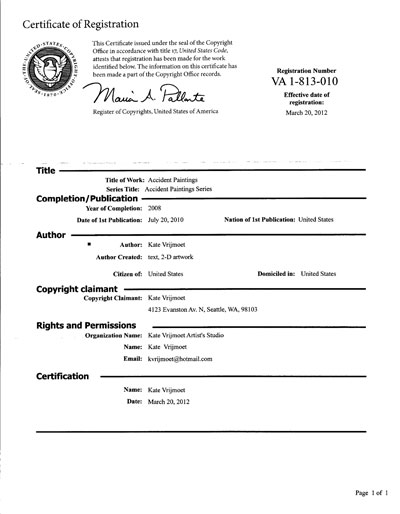Omphaloskepsis Blog
Copyright Basics for Artists
May 22, 2012
What exactly is a copyright? How do I copyright my work? Is it difficult? Expensive? And why should I bother?
For years I put that little circle-c at the bottom of every page pretending my work was copyrighted. At least I thought I was cheating. But I wasn’t. As soon as I create a work, I own the copyright. The difference is between owning and registering the copyright. And that’s the very important distinction I want to write about today.
So go ahead, draw that circle-c or hit “option-g” (Mac-users) as you blog, build web pages, write, draw, paint, dance, sew, make sound art, sculpt and other forms of art. And then log onto www.copyright.gov and pay the $35 online fee ($65 mail-in) to register your copyright.
This is a four-part blog about copyrights. First a disclaimer: you should know I am not an attorney. I did not go to law school. The information I am providing came from consultations with my attorney, legal seminar, experience, and the US governement website and pamphlets. For those of you on the fast track, attached above is one such pamphlet I downloaded in March 2012 from the governemet website www.copyright.gov that provides tips on how to register your copyright.
In the first blog I’m going to explain to you what a copyright is, who owns it and why register your copyright. The following blog will walk you step-by-step through the process of copyrighting a piece of art, using visuals, links and simple instructions.
The third blog in this series will talk about what is and is not covered by copyright, how long a copyright lasts, how you know if someone has infringed on your copyright, and take a look at some current arts copyright disputes.
Finally we’ll take a look at Fair Use and VARA and look at some dispute cases involving those. And I’ll talk briefly about reciprocity. So, let’s get started.
What exactly is a copyright? It’s a right exclusively held by authors of original works. A copyright is imparted and fixed automatically on creation of the work to copy, distribute, perform and do other things and to authorize others to do those things for a limited term. In other words, you automatically and unconditionally own the copyright of your work as soon as you create it.
A copyright is a constitutionally grounded US government-granted monopoly (intellectual) property right: “The Congress shall have Power … [sic] to promote the Progress of Science and useful Arts, by securing for limited Times to Authors and Investors the exclusive Right to their respective Writings and Discoveries.” (Article I, Section 8, Clause 8 of U. S. Constitution) Implemented by federal statue – 17 USC 101-1332
As soon as you create the work you automatically own the copyright. However, that is not the same thing has registering your copyright. (Contrary to urban legend, you cannot register your copyright my making a copy and mailing it to yourself.) You register it through the US copyright office. http://www.copyright.gov There they provide many .pdf pamphlets for you to download with guidelines and instructions on how to register your copyright. I’m going to walk you through it step-by-step in the second blog segment on Copyright Basics for Artists.
Also, if you work as in independent contractor, (not an employee), you own the copyright to the work you create unless it’s bestowed in writing to the contractor in a “work made for hire” agreement (and the work is a contribution to a collective work, part of a motion picture or other audiovisual work, a translation, a supplementary work, a compilation, an instructional text, a test, answer material for a test, an atlas).
Sample_Work-For-Hire_Agreement.pdf
I found this Sample “Work Made for Hire” Agreement published and distributed on the web for free by the St. Louis Volunteer Lawyers and Accountants for the Arts.
Ownership of your copyright does not require you to register it, but its strongly recommended because (And here's the good part!)
- it is required for enforcement of exclusive rights via court suit (infringement action).
- It provides evidence of validity, proof that the copyright belongs to you and allows for recovery of statutory damages and attorney’s fees if registration occurs within three months of first publication or prior to infringement.
- In addition to statutory damages, what that gets you is attorney’s fees covered. Copyright litigation can cost $75,000. If your copyright is registered, you are assigned attorney’s fees. The penalties (Remedies) for copyright infringement Statutory damages of $750-$30,000 per work infringed, or up to $150,000 if willful and attorney fees and costs.
- Injunctive relief – a court order instructing the offending party to stop their harmful action, and impoundment, seizure and/or destruction of materials. (17 U.S.C. sections 502-511)

This is what a certificate of registration looks like. I applied in late March and received this certificate in the mail just shy of two months later. I paid $35 online to register a whole series of paintings. If you choose, you can register individual works for $35 each. The difference is in compensatory damages. You get a maximum of $150,000 per registered copyright, not per work.
You can hire a copyright attorney to register your copyrights for you at about $350/hour. Or you can hire a copyright attorney to look over your copyright application to make sure everything is in order for about $100. Or you can do what I did — do it yourself.
In the next segment on copyright, I’ll show you with step-by-step instructions and graphics how to register your copyright online.
Thank you to:
WLA
K&L|GATES
VLAA St. Louis
Cinnamon Stevens, esq
Mark Wittow, esq
 MENU
MENU